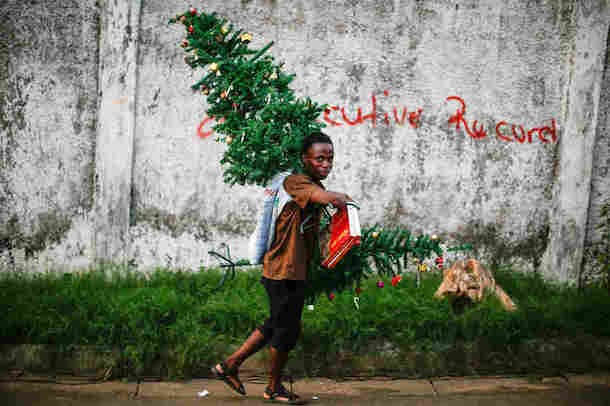
A man peddles plastic Christmas trees and lights in downtown Monrovia. Photo credit: Intelink Ebola Digest
1. Better Ebola tests expected within months
New diagnostic tests to more rapidly and simply detect Ebola could be available for use in the West Africa epidemic in the next few months, the World Health Organization and partner agencies say. It now takes between nine hours and four days to get confirmation of a suspected case of Ebola in West Africa. By any measure, this is too long because the virus spreads quickly and more infections can occur while awaiting test results. Health agencies agree there is an urgent need for innovative ways to provide rapid, sensitive, safe and simple testing. Read more.
2. New Ebola outbreak patterns emerging
For the second week in a row, the WHO said there are signs in Sierra Leone that disease incidence is no longer climbing. In its assessment of the response, the WHO said all three countries (Guinea, Sierra Leone, and Liberia) have enough capacity to isolate sick patients and conduct safe burials, the key tools to fighting Ebola, but the uneven distribution in some areas is creating a shortfall. Read more.
3. Community mobilization is key to reducing Ebola transmission rates
Citing the “memorable and moving” example of a Sierra Leonean nurse who had contracted Ebola but became a caregiver as soon as she had recovered, United Nations Secretary-General Ban Ki-moon said last week that kind of commitment “should move us all to do more to end the outbreak” in West Africa. Mr. Ban spoke to reporters at UN Headquarters upon his return from a trip to the region that took him to Guinea, Liberia, Mali, Sierra Leone and Ghana to ensure that “the UN response is a rapid, effective and comprehensive one.” Read more.
4. Increased food assistance funding for Ebola affected countries
The United Nations World Food Programme (WFP) today welcomed a US $1 million grant from the African Development Bank (ADB) to help fight Ebola in Sierra Leone. The contribution will be used to support the Government of Sierra Leone and WFP in meeting the essential food and nutrition needs of vulnerable people and communities affected by Ebola. With this grant, WFP will provide food assistance for two months to 30,000 people. In some areas worst-affected by the disease. Read more.
5. The Ebola response situation summary
As of this week, there have been a total of 19,497 confirmed, probable, and suspected cases of Ebola virus disease (EVD) have been reported in four affected countries (Guinea, Liberia, Mali and Sierra Leone) and four previously affected countries (Nigeria, Senegal, Spain and the United States of America). It is reported that case incidence is declining in Liberia. In Sierra Leone, there are signs that the increase in incidence has slowed, and that incidence may no longer be increasing. Read the full Ebola response roadmap situation, now available in an interactive map journal that shows the evolution of the outbreak and the global response. Read more.



 View All Blog Posts
View All Blog Posts